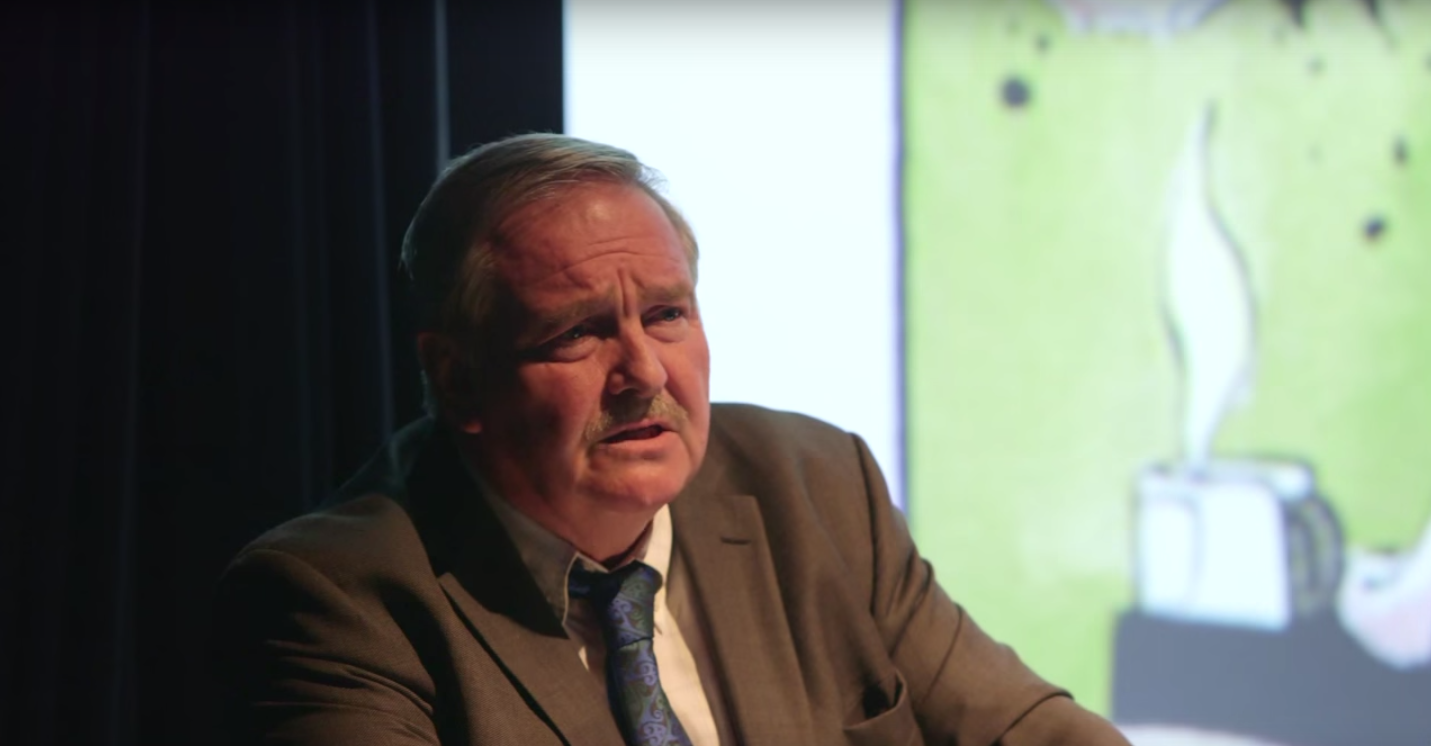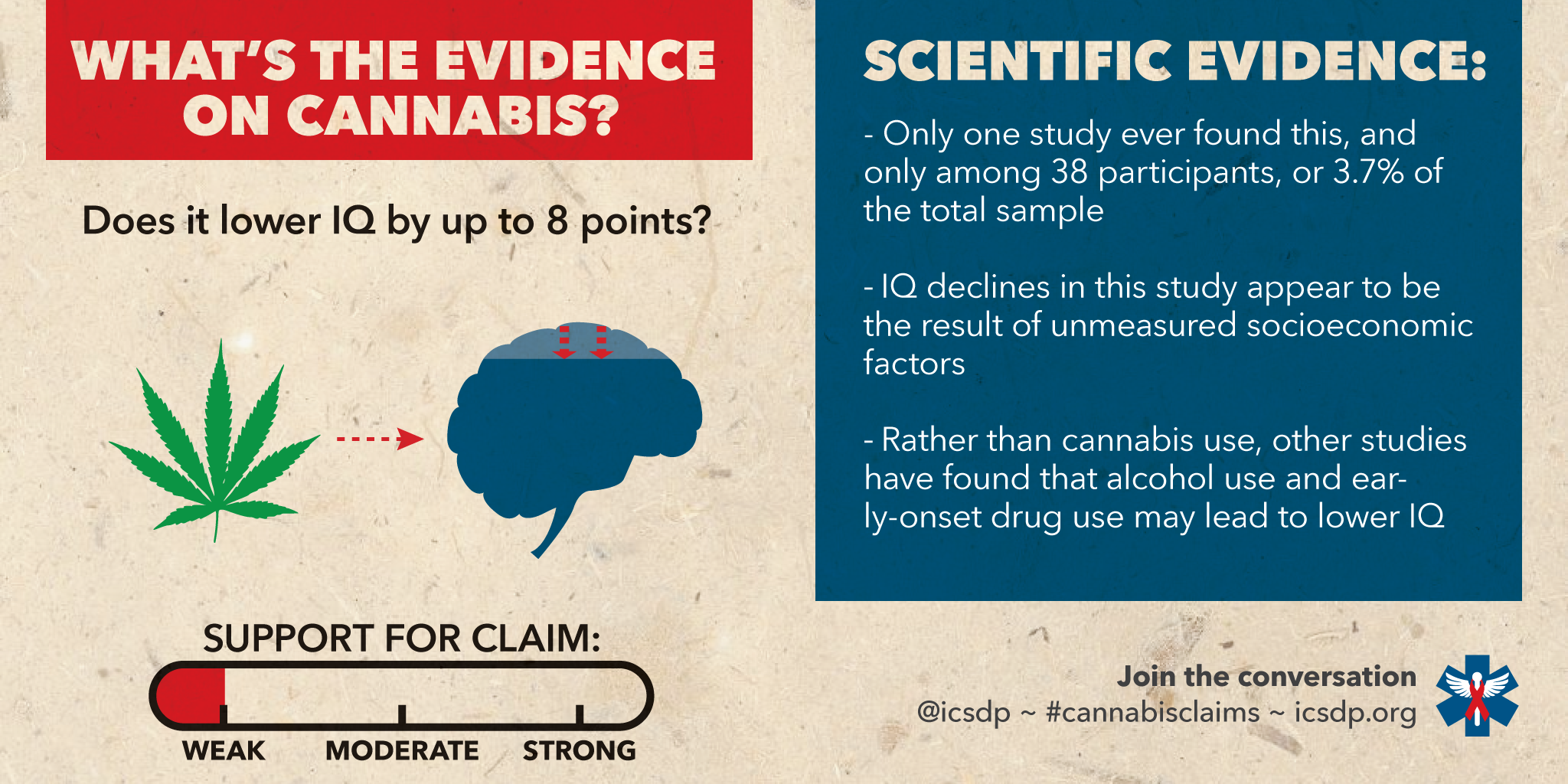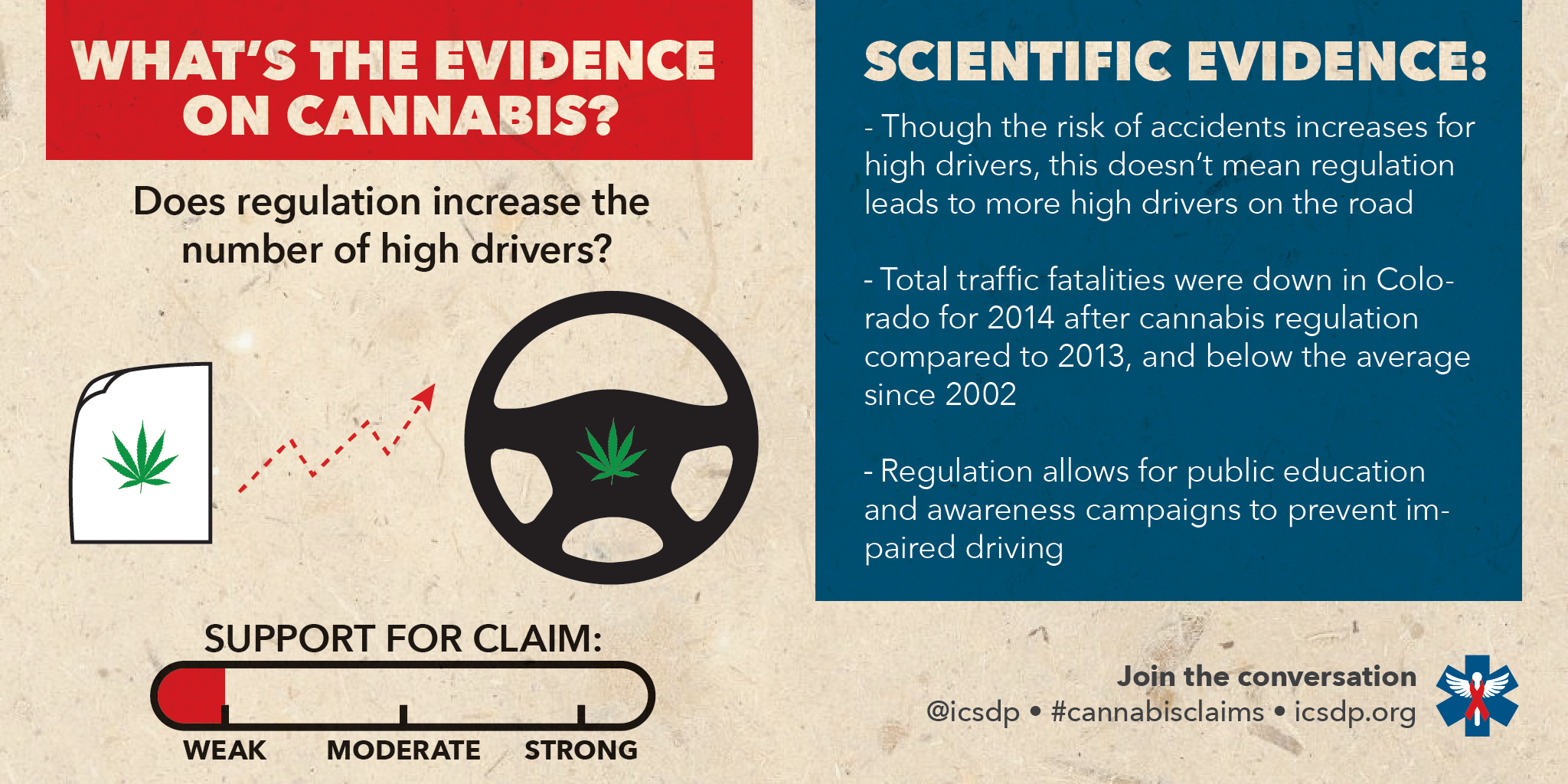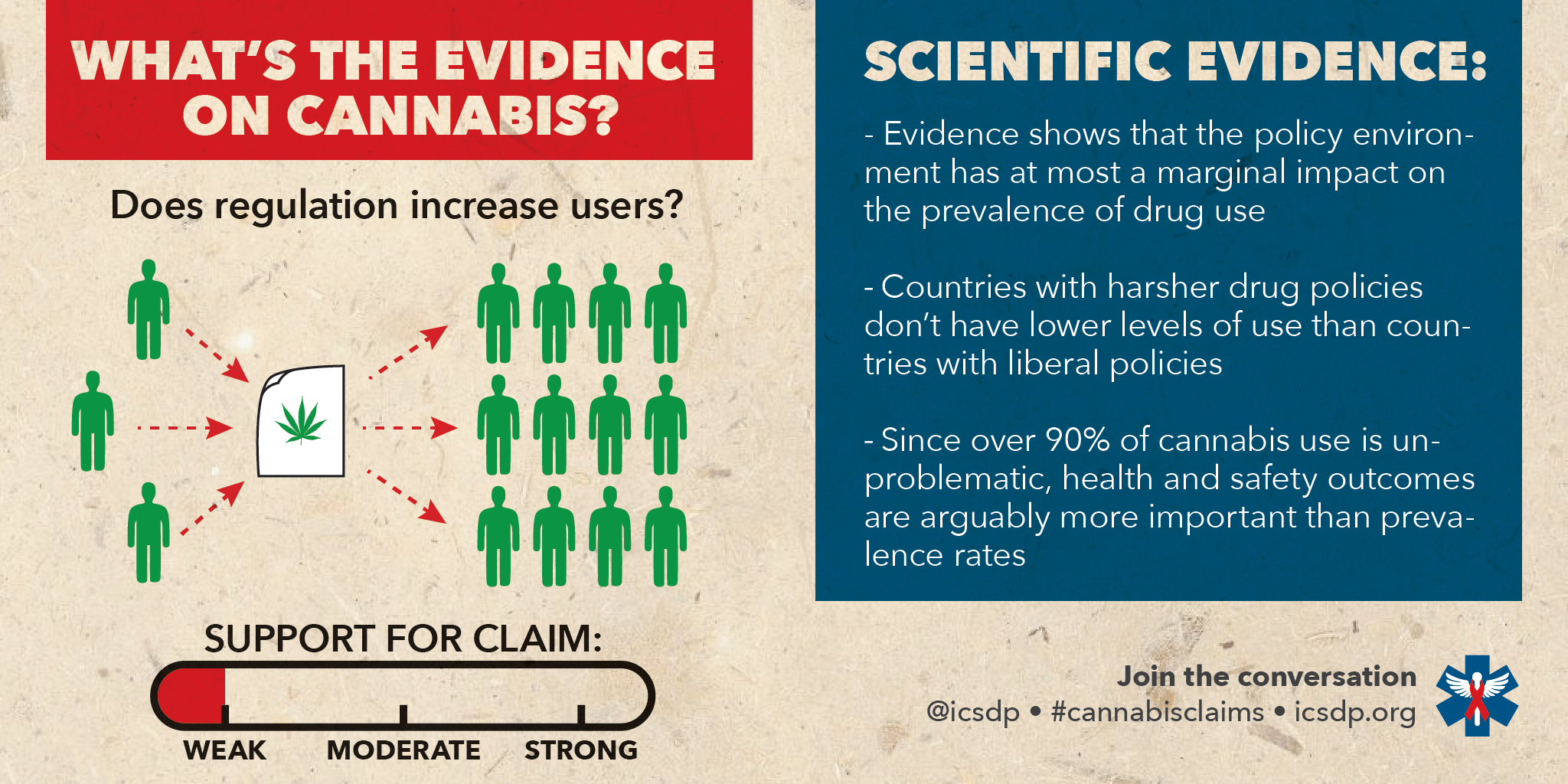 Some of the claims and counter-claims on a slew of topics related to Cannabis use and regulation, for example, "Cannabis is as addictive as heroin", "Cannabis causes schizophrenia", and one of the latest in a long line of headlines that should be called imaginative journalism at best, "Cannabis regulation leads to increased traffic fatalities", are just some that pop up, again and again, in news articles and online. They sound true to some, perhaps because they are repeated so many times and because they are often said to be based on scientific evidence. In the United Kingdom (UK) the Telegraph ran the headline in 2015; “Cannabis as addictive as heroin, major new study finds”. On the surface this claim reads as if it were backed by scientific evidence. But, as is so often the case, it wasn't. The International Centre for Science in Drug Policy (ICSDP) tasked itself with determining the strength of scientific support for such 'Cannabis Claims' and narrowed down the list of most oft used falsehoods to thirteen (see all Cannabis Claims at the end of this article), finding that not one of the claims was strongly supported by any scientific evidence.
Some of the claims and counter-claims on a slew of topics related to Cannabis use and regulation, for example, "Cannabis is as addictive as heroin", "Cannabis causes schizophrenia", and one of the latest in a long line of headlines that should be called imaginative journalism at best, "Cannabis regulation leads to increased traffic fatalities", are just some that pop up, again and again, in news articles and online. They sound true to some, perhaps because they are repeated so many times and because they are often said to be based on scientific evidence. In the United Kingdom (UK) the Telegraph ran the headline in 2015; “Cannabis as addictive as heroin, major new study finds”. On the surface this claim reads as if it were backed by scientific evidence. But, as is so often the case, it wasn't. The International Centre for Science in Drug Policy (ICSDP) tasked itself with determining the strength of scientific support for such 'Cannabis Claims' and narrowed down the list of most oft used falsehoods to thirteen (see all Cannabis Claims at the end of this article), finding that not one of the claims was strongly supported by any scientific evidence.
As a neuropsychopharmacologist at the Imperial College London, Professor David Nutt studies the impact of drug use on the brain. On the whole, his years of research on drug use has taught him a major overarching lesson that we are much more likely to demonise drugs for their negative effects than consider their neutral or potentially positive impacts. Or, in scientific terms, there is a built-in bias in the scientific literature, textbooks and the popular press towards highlighting the negative aspects of drug use. And more ink has dried on Cannabis (a herb) than any other substance, perhaps because it’s the most widely used illegal substance and the subject of intense debate concerning its regulation. Professor Nutt's research focuses on neurological function and he often comes across claims about Cannabis’ impact on the brain. You’ve likely heard them too, including claims that Cannabis use lowers IQ by up to 8 points and that use causes schizophrenia and impairs cognitive function in the long term. What’s fascinating about these claims is that they’re almost always purportedly “based on the scientific evidence”, but we already know this is not the case. The ICSDP reports addressed this head-on by evaluating the science in support of some of the most high-profile claims about Cannabis. The results are compelling: taken together, they demonstrate how easily evidence can be twisted to support political ends.
An example, often-repeated, is that Cannabis causes a drop in IQ of up to 8 points, the major finding of a 2012 report from Duke University (North Carolina, United States [US]). But, these results were based on one very minor study and the 8-point drop in IQ was observed in only 38 individuals
(3.7% of the total sample). In 2014 a University College London report was published that re-examined this issue in another group of young people, with a sample size over twice as large as the Duke study and taking into account alcohol use, cigarette use, maternal education and other potential confounders. The result? The authors found no association between Cannabis and IQ at all, not even among heavy Cannabis users. It is clear that we are some way off from a final answer to the question of whether Cannabis is ever harmful to intelligence.
Another example of deceit is that science does not suggest Cannabis is as addictive as heroin, in fact, science tells us Cannabis is not an addictive substance at all. Around 147 million people worldwide (2.5% of the world population) have used Cannabis with no clear evidence of any withdrawal syndrome, let alone dependence. A lifetime of Cannabis use
carries a low risk of dependence (9%, less than one in ten people). Rates of lifetime dependence to heroin, by contrast, are about one in four. The risk of dependence is very low among those who report using it for one year (2%) or even 10 years (5.9%). This is much lower than the estimated lifetime risk of dependence to heroin (23.1%).
The question, "Does Cannabis use cause schizophrenia?" is still routinely answered by mainstream media and many in both private and public health systems, the pharmaceutical industry and law enforcement (just to name a few with a seemingly vested interest in the illegality of Cannabis) with a resounding "yes", but they are all patently wrong. While studies have shown Cannabis use is associated with schizophrenia, this is a very different claim. Scientists suggest people at risk of schizophrenia might actually use Cannabis to mitigate early symptoms of the condition and that this is the reason for the association. The claim, then, confuses correlation with causation. Furthermore, if Cannabis use caused schizophrenia, we would presumably see changes in schizophrenia rates based on levels of Cannabis use. But during a period when Cannabis use increased fourfold in the UK (1970–2010), the incidence of schizophrenia remained essentially stable. In 2013 research by Harvard Medical School, published in Schizophrenia Research from a comparison between families with a history of schizophrenia and those without, found little support for Cannabis use as a cause of schizophrenia. "The results of the current study suggest that having an increased familial morbid risk for schizophrenia may be the underlying basis for schizophrenia in Cannabis users and not Cannabis use by itself”.
Cannabis impacts the very system that research suggests has a major role in schizophrenia, the Endocannabinoid System (ECS), which is involved in neurotransmission and regulation of functions
such as sleep, cognition and emotion. The ECS is also involved in reward processing, which recent findings suggest is deficient in patients with schizophrenia spectrum disorders. Matthijs Bossong, PhD, of the Rudolf Magnus Institute of Neuroscience, University Medical Centre Utrecht in the Netherlands explained in Psychiatry
Advisor, “It has been shown that patients with schizophrenia have enhanced levels of endogenous cannabinoids as measured both in their blood and cerebrospinal fluid and neuro-imaging studies and post-mortem examinations have shown that they have increased levels of cannabinoid receptors in their brains".
Bossong co-authored a review in 2014, Role of the Endocannabinoid System in brain functions relevant for schizophrenia: An overview of human challenge studies with Cannabis or Δ9-Tetrahydrocannabinol (THC), in the journal, Progress in Neuro-Psychopharmacology & Biological Psychiatry, while at the Institute of Psychiatry, King's College London, which provided further support for the involvement of the ECS in symptoms of schizophrenia. “For many brain functions, such as memory, executive function and emotional processing, we found striking similarities between 'Cannabis-intoxicated' healthy volunteers and non-intoxicated schizophrenia patients”, he said.
"Does
Cannabis regulation lead to more traffic fatalities as a result of people driving while affected by Cannabis?" In the state of Colorado (US), recreational Cannabis use and possession was regulated in 2012. Since then, traffic fatality rates have been below the yearly average seen since 2002 (over a decade). So, there isn’t any evidence to suggest regulating Cannabis will lead to more people involved in deadly car crashes. This claim seems to be rooted in the assumption that impaired driving will increase because Cannabis use will increase under a regulatory scheme. It is therefore worth emphasising that scientific evidence has not found an association between levels of Cannabis use and any national Cannabis policies.
It is important to note that responsible regulatory schemes would not legalise driving under the influence of Cannabis. It remains an offence in Colorado and indeed the law has arguably been tightened with new Tetrahydrocannabinol (THC) blood limits, increased enforcement efforts and a public education drive funded in part by Cannabis tax revenue. Importantly, compared to prohibition, Cannabis regulation allows for detailed public education and awareness campaigns to prevent any perceived risky behaviours, such as impaired driving, as has occurred with drunk driving. Interestingly, experts agree the risk of motor vehicle collisions is much lower for Cannabis use compared to the risk associated with alcohol use. The impact of alcohol intoxication on driving should therefore remain a far greater
public health concern.
In Washington state (US) where Cannabis was legalised and regulated in 2012, members of law enforcement, Sheriff John Urquhart of King County and John Schochet, Deputy City Attorney for Policy and Constituent Affairs from the Seattle City Attorney's Office, shared their thoughts on how regulation has impacted impaired driving (excerpts from a September 2015 interview with responses condensed for clarity).
Q: "A claim we often hear is that Cannabis regulation will lead to greater impaired driving. What has your experience of Cannabis impaired driving been since legalising and regulating Cannabis markets in Washington State?"
A: John Schochet: "Cannabis legalisation does not seem to have increased DUI's overall, though it might be that some Cannabis DUI's are substituting for alcohol DUI's. Overall, DUI increases are not an enormous problem when it comes to marijuana* legalisation".
A: Sheriff Urquhart: "The Washington State Patrol's numbers indicate that, despite the
legalisation of recreational marijuana*, driving under the influence (DUI) has not measurably increased".
Q:
"How has Initiative 502 (Washington State's Cannabis legislation) impacted the way individuals are convicted of driving under the influence of Cannabis?"
A: John Schochet: "First, it's worth emphasising Cannabis legalisation didn't mean impaired driving was legalised. What it did do was make it easier to convict people who are actually driving 'stoned' (impaired), rather than those who simply show evidence of Cannabis use in their blood. There are two substances that can be determined by a blood test; Carboxy-THC and active THC. Carboxy-THC doesn't indicate impairment because it stays in your blood for a long time. It just shows that you used Cannabis at some point. Active THC actually shows impairment. Without other evidence of impairment, basing conviction on carboxy alone is unreasonable. But before 502, a lot of people were being convicted of driving under the influence of Cannabis based on just carboxy in the blood" (as is the case across Australia where no impairment is required for law enforcement to interfere with the healthcare of sick and suffering, sometimes dying, otherwise law-abiding citizens).
 A: Sheriff Urquhart: "Investigating impairment solely for marijuana* use has historically been a little tricky. The officer would have to prove impairment based on his or her observations of the driver and often a drug recognition expert would have to observe the driver as well. With the new 'per se' limits on THC, however, it has become much easier to investigate and prosecute a driver for being impaired solely from marijuana*".
A: Sheriff Urquhart: "Investigating impairment solely for marijuana* use has historically been a little tricky. The officer would have to prove impairment based on his or her observations of the driver and often a drug recognition expert would have to observe the driver as well. With the new 'per se' limits on THC, however, it has become much easier to investigate and prosecute a driver for being impaired solely from marijuana*".
Q: "Given all your experience, how do you respond to the claim that we shouldn't legalise and regulate Cannabis because it will lead to more 'stoned' drivers?"
A: John Schochet: "Is there a concern with impaired driving? Absolutely. It's a huge issue with alcohol and has been for a long time. But our response isn't to ban alcohol. Our response is to go after people who drive impaired
and to engage in public safety campaigns. So when it comes to impaired driving, I view it as something we should be worried about, but it is not a justification for banning marijuana*".
A: Sheriff Urquhart: "The truth of the matter is that regulation will come with harms. The key is weighing the costs and benefits of a regulated v's unregulated market. We have been fighting a futile drug war for over 40 years. I'm pleased we are not allowing the fear of change to impede the search for a better way".
A: Sheriff Urquhart: "The truth of the matter is that regulation will come with harms. The key is weighing the costs and benefits of a regulated v's unregulated market. We have been fighting a futile drug war for over 40 years. I'm pleased we are not allowing the fear of change to impede the search for a better way".
The examples of fact over fallacy given are only a few of those reviewed by the ICSDP 'Cannabis Claims'. The main conclusion is that, for the most part, the global conversation around Cannabis policy still remains mired in unscientific claims. And that can and does have serious consequences for the effectiveness and potential harms of Cannabis policies in many countries, including Australia, New Zealand, Canada and both the UK and US (just to mention a few).
Given the conflicting findings on this issue, why do any of these dangerous claims continue to circulate as if unequivocally true? Part of it has to do with our appetite for discovery: our society is wired, for better or for worse, to celebrate and obsess over technological and scientific breakthroughs. So when a new scientific finding is made, particularly about a substance like Cannabis that so many people are familiar with, it makes headlines. Unfortunately, it seems that after those initial “discovery moments,” our collective interest in the issue wilts away. Put another way, the initial studies always make
headlines, in both the scientific and popular press; the corrections and conflicting findings that come a year, two years or five years later? Not so much.
 In Canada during the 2015 federal election the then Canadian government’s production of anti-Cannabis public service announcements drew the ire of the country’s main physician group, the Canadian Medical Association, which refused to endorse the so-called 'educational campaign' because it believed the ads were serving political rather than educational goals. In the US and elsewhere, third-party advocacy groups continue to spread disinformation about Cannabis. Kevin Sabet, director of Smart Approaches to Marijuana*, an anti-regulation group in the US stated on CNN that Cannabis “is
a drug that can result in serious, long-term consequences, like schizophrenia”, a claim that is not backed by any science. In Australia the leader in 21st century 'reefer madness' is the National Cannabis Prevention and Information Centre, NCPIC (federally funded, i.e., with tax-payer dollars added to regularly by pharmaceutical industry funds and 'donations'). The President of the Australian HEMP Party noted in September last year that, "With statements like, ‘Cannabis is addictive and there’s no proof it’s useful for medical purposes’, the NCPIC needs to grow up ... 'It’s as addictive as tobacco with severe withdrawal symptoms and it causes lung cancer' is more reefer madness nonsense from them ...”.
In Canada during the 2015 federal election the then Canadian government’s production of anti-Cannabis public service announcements drew the ire of the country’s main physician group, the Canadian Medical Association, which refused to endorse the so-called 'educational campaign' because it believed the ads were serving political rather than educational goals. In the US and elsewhere, third-party advocacy groups continue to spread disinformation about Cannabis. Kevin Sabet, director of Smart Approaches to Marijuana*, an anti-regulation group in the US stated on CNN that Cannabis “is
a drug that can result in serious, long-term consequences, like schizophrenia”, a claim that is not backed by any science. In Australia the leader in 21st century 'reefer madness' is the National Cannabis Prevention and Information Centre, NCPIC (federally funded, i.e., with tax-payer dollars added to regularly by pharmaceutical industry funds and 'donations'). The President of the Australian HEMP Party noted in September last year that, "With statements like, ‘Cannabis is addictive and there’s no proof it’s useful for medical purposes’, the NCPIC needs to grow up ... 'It’s as addictive as tobacco with severe withdrawal symptoms and it causes lung cancer' is more reefer madness nonsense from them ...”.
According to Professor Nutt, the other main reason that false claims about Cannabis continue to circulate is a little more insidious. It boils down to the trust we place in our gut feelings and the way that we’ve been educated about drug use in general. Using substances like Cannabis, we’ve been taught, makes you stupid. So when those ignorant of the truth about Cannabis see a headline touting scientific evidence consistent with how the mainstream has been educated to feel about Cannabis, it becomes very appealing as a way to validate our gut instincts. When that science is shown to be equivocal or false, though, there’s a lot more work that has to go into adjusting those same instincts. Instead of changing our minds based on the evidence, it is much easier just to ignore it. The end result is too often that the many scientific corrections, refutations and re-interpretations of the evidence just get swept under the carpet. We don’t want to believe we have been misled for all these years.
There’s one more important reason, Professor Nutt believes that reporting on Cannabis science tends towards the negative; money. Scientists examining the health and social impacts of substances are usually funded by government agencies and they often highlight the negative effects of substances to justify their own source of funding. If a scientist can show that a substance is harmful, then they can show that it’s important to do more research on the topic to protect society. The more harmful the substance appears to be, the more critical it is to fund research on it, so their funding is perpetuated. By contrast, if use of a substance appears to have only benign effects, then why would governments bother spending more research money on it? This cycle has perpetuated a scientific industry intent on demonstrating the harmful effects of substances like Cannabis, precisely because doing so allows the industry to justify its own existence. Of course, one of the major consequences of this cycle is that research on the potential benefits of substances gets sidelined, for example with not nearly enough government funding for studies on Cannabis’ health benefits.
There is a massive and growing scientific literature on Cannabis. And yet, for all its complexities and contradictions, we only tend to hear about the most negative study outcomes. When people state with conviction that Cannabis causes a loss of IQ points, or causes schizophrenia, they are absolutely wrong in their certainty. Whilst the evidence accumulates, we need to remain open-minded to the possibility that Cannabis does not impact IQ or cause schizophrenia. Understanding the scientific evidence on these issues, which the ICSDP’s reports help us to do, is the first step towards having an informed discussion about how we as a society should treat Cannabis. The harder part is understanding and overcoming the many obstacles that restrict the use of that same evidence in our public discourse.
*Cannabis
sativa L., is the correct botanical term, marijuana* is a North
American colloquialism
#CannabisClaims is a campaign by scientists and academics to set the record straight on thirteen of the most oft-repeated claims on Cannabis use and regulation, none of which are strongly supported by the scientific evidence. As more and more jurisdictions reconsider their Cannabis policies, the public discourse is filled with conflicting evidence about the impacts of Cannabis use and regulation.
Adapted from, Separating Fact From Fiction In The Cannabis Debate with Here's Why We Hear So Many False Claims About Cannabis, How Cannabis Legalization Has Impacted Impaired Driving in Washington State, Impact of Regulation on Drug Crime & Impaired Driving, Using Evidence to Talk About Cannabis, Toward a Global View of Alcohol, Tobacco, Cannabis, and Cocaine Use: Findings from the WHO World Mental Health Surveys, Marijuana and Driving, Epidemiology and consequences of drinking and driving, Drug use and fatal motor vehicle crashes: A case-control study, Marijuana use and motor vehicle crashes, Schizophrenia and Psychoses/Cannabis and Schizophrenia -Trigger or Treatment












No comments:
Post a Comment